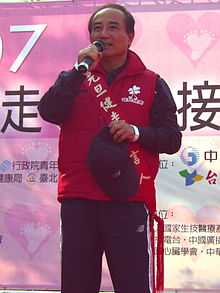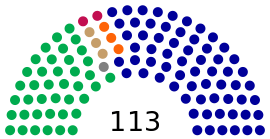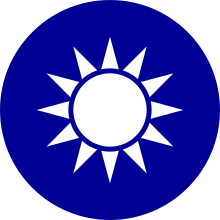Legislative Yuan
| ||||||||||||||||||||||||||||||||||||||||||||||||||||||||||||||||||||||||||||||||
The Legislative Yuan (Chinese: 立法院; pinyin: Lìfǎ Yuàn; Wade–Giles: Li4-fa3 Yüan4; Pe̍h-ōe-jī: Li̍p-hoat Īⁿ) is the unicameral legislature of the Republic of China (ROC).
The Legislative Yuan is one of the five branches (called 'yuàn', "courts") of government stipulated by the Constitution of the Republic of China, which follows Sun Yat-sen's Three Principles of the People. Although sometimes referred to as a "parliament", the Legislative Yuan, under Sun's political theory, is a branch of government. Only the now abolished National Assembly of the Republic of China, with the power to amend the constitution and to formally elect the President and Vice President, could be considered a parliament. However, after constitutional amendments effectively transferring almost all of the National Assembly's powers to the Legislative Yuan in the late 1990s, it has become more common in Taiwanese newspapers to refer to the Legislative Yuan as the Parliament (國會, guóhuì).
Composition
_Legislative_Yuan_of_the_Republic_of_China_(chamber%2C_interior).jpg)

Starting with the 2008 legislative elections, drastic changes were made to the Legislative Yuan in accordance with a constitutional amendment passed in 2005. The Legislative Yuan has 113 members, down from 225. Legislators are elected to office through the following ways:
- 73 are elected under the first-past-the-post system in single-member constituencies.
- 34 are elected under the supplementary member system on a second ballot, based on nationwide votes, and calculated using the largest remainder method. Any party which receives 5% or more of the Party vote can enter the parliament. For each party, at least half of the legislators elected under this system must be female.
- 6 seats are elected by aboriginal voters through single non-transferable vote in two three-member constituencies.
Members serve four-year terms, with the 8th Legislative term serving from 2 February 2012 to 2 February 2016. The 5 largest parties with 3 seats or more can form caucuses. If there are fewer than 5 such parties, legislators in other parties or with no party affiliation can form caucuses with at least 4 members.[1]
| Party | Caucus Whip | Seats | |
|---|---|---|---|
| Kuomintang (KMT) | Alex Fai Hrong-tai (majority) | 65 | |
| Democratic Progressive Party (DPP) | Ker Chien-ming (minority) | 40 | |
| Taiwan Solidarity Union (TSU) | Lai Chen-chang (minority) | 3 | |
| People First Party (PFP) | No Caucus | 2 | |
| Non-Partisan Solidarity Union (NPSU) | No Caucus | 1 | |
| Independent/Non-partian | No Caucus | 1 | |
| vacant | 1 | ||
| (as of November 2014) | Total | 113 | |
The previous legislature had 225 members. Legislators were elected in the following ways:
- 168 were elected by popular vote through single non-transferable vote in multi-member consistencies
- 41 were elected on the basis of the proportion of nationwide votes received by participating political parties.
- 8 were allocated for overseas Chinese and were selected by the parties on the basis of the proportion of votes received nationwide.
- 8 seats were reserved for the aboriginal populations.
Legislative role and fist fights during parliament session
The Legislative Yuan has the power to pass all ordinary legislation. The amount of control the Legislative Yuan has over the Executive Yuan was unclear throughout the 1990s, but a convention has developed that the Executive Yuan is responsible to the President of the Republic of China and not the Legislative Yuan.
Much of the work of the Legislative Yuan is done via legislative committees, and a common sight on Taiwanese television involves officials of the executive branch answering extremely hostile questions from opposition members in committees. In the 1990s, there were a number of cases of fist fights breaking out on the floor, usually triggered by some perceived unfair procedure ruling, but in recent years, these have become less common. There was a brawl involving 50 legislators in January 2007 and an incident involving 40 legislators on 8 May 2007 when a speaker attempted to speak about reconfiguring the Central Election Committee. It has been alleged that fights are staged and planned in advance.[2] These antics led the scientific humor magazine Annals of Improbable Research to award the Legislative Yuan its Ig Nobel Peace Prize in 1995 "for demonstrating that politicians gain more by punching, kicking and gouging each other than by waging war against other nations".[3]
The other Yuans are authorized to propose legislative bills to the Legislative Yuan. Legislative bills proposed by the Legislative Yuan have to be cosigned by a certain number of legislators. Once a bill reaches the legislature, it is subject to a process of three readings.
History
History on Mainland
The original Legislative Yuan was formed in the original Capital of Nanjing after the completion of the Northern Expedition. Its 51 members were appointed to a term of two years. The 4th Legislative Yuan under this period had its members expanded to 194, and its term in office was extended to 14 years because of the Second Sino-Japanese War (1937–45). According to KMT political theory, these first four sessions marked the period of political tutelage.
The current Constitution of the Republic of China came into effect on December 25, 1947, and the first Legislative session convened in Nanking on May 18, 1948, with 760 members. Six preparatory meetings had been held on May 8, 1948, they, during which Sun Fo and Chen Li-fu were elected President and Vice President of the body, respectively. In 1949, the mainland fell to the Communists and the Legislative Yuan (along with the entire ROC government) was transplanted to Taipei. On February 24, 1950, 380 members convened at the Sun Yat-sen Hall in Taipei.
History on Taiwan
The first Legislative Yuan was to have been elected for a term of three years ending in 1951; however, the fall of the Mainland made it impossible to hold new elections.[4] As a result, the Judicial Yuan decided that the members of the Legislative Yuan would continue to hold office until new elections could be held on the Mainland. This decision was made in the belief that the KMT would retake the Mainland in a short time. However, over the years, as the prospect of regaining the Mainland diminished, this meant that the legislators from mainland districts (and members of the ruling KMT) held their seats for life, in a one-party system. The body thus came to be called "the Non-reelected Congress".[4]
Over the years, deceased members elected on the mainland were not replaced while additional seats were created for Taiwan starting with eleven seats in 1969. Fifty-one new members were elected to a three-year term in 1972, fifty-two in 1975, ninety-seven in 1980, ninety-eight in 1983, one hundred in 1986, and one hundred thirty in 1989. Although the elected members of the Legislative Yuan did not have the majority to defeat legislation, they were able to use the Legislative Yuan as a platform to express political dissent. Opposition parties were formally illegal until 1991, but in the 1970s candidates to the Legislative Yuan would run as Tangwai ("outside the party"), and in 1985 candidates began to run under the banner of the Democratic Progressive Party.
The original members of the Legislative Yuan remained until December 31, 1991, when as part of subsequent Judicial Yuan ruling they were forced to retire and the members elected in 1989 remained until the 161 members of the Second Legislative Yuan were elected in December 1992. The third LY, elected in 1995, had 157 members serving 3-year terms. The fourth LY, elected in 1998, was expanded to 225 members in part to include legislators from the abolished provincial legislature of Taiwan Province.
| Wikibooks has a book on the topic of: Annotated Republic of China Laws/Additional Articles of the Constitution of the Republic of China/Article 4 |
The Legislative Yuan greatly increased its prominence after the 2000 Presidential elections in Taiwan when the Executive Yuan and presidency was controlled by the Democratic Progressive Party while the Legislative Yuan had a large majority of Kuomintang members. The legislative elections in late 2001 produced a contentious situation in which the pan-blue coalition has only a thin majority over the governing pan-green coalition in the legislature,<ref name = ̈"Carr">Carr, Adam (2001). "Taiwan". </ref> making the passage of bills often dependent on the votes of a few defectors and independents. Because of the party situation there have been constitutional conflicts between the Legislative Yuan and the executive branch over the process of appointment for the premier and whether the president has the power to call a special session.
Amid 70% public support, the Legislative Yuan voted 217-1 on August 23, 2004 for a package of amendments to:
- Halve the number of seats from 225 to 113
- Switch to a single-member district parallel voting electoral system
- Increase the terms of members from 3 to 4 years, to synchronize the legislative and presidential elections. (It is unclear whether this will be implemented for the next presidential and legislative elections.)
The new electoral system will include 73 plurality seats (one for each electoral district), 6 seats for aboriginals, with the remaining 34 seats to be filled from party lists. Every county has a minimum of 1 electoral district, thereby guaranteed at least one seat in the legislature, while half of the proportionally represented seats drawn from party lists must be women.
Additionally, the Legislative Yuan proposed to abolish the National Assembly. Future amendments would still be proposed by the LY by a three-fourths vote from a quorum of at least three-fourths of all members of the Legislature. After a mandatory 180-day promulgation period, the amendment would have to be ratified by an absolute majority of all eligible voters of the ROC irrespective of voter turnout. The latter requirement would allow a party to kill a referendum proposal by asking that their voters boycott the vote as was done by the KMT with the referendums associated with the 2004 Presidential Election.
A DPP proposal to allow the citizens the right to initiate constitutional referendums was pulled off the table, due to a lack of support. The proposal was criticized for dangerously lowering the threshold for considering a constitutional amendment. Whereas a three-fourth vote of the LY would require that any proposed constitutional amendment have a broad political consensus behind it, a citizen's initiative would allow a fraction of the electorate to force a constitutional referendum. It was feared that allowing this to occur would result in a referendum on Taiwan independence which would likely result in a crisis with the People's Republic of China.
The Legislative Yuan also proposed to give itself the power to summon the president for an annual "state of the nation" address and launch a recall of the president and vice president (proposed by one fourth and approved by two thirds of the legislators and be submitted to a nationwide referendum for approval or rejection by majority vote). The Legislative Yuan will also have the power to propose the impeachment of the president or vice president to the Council of Grand Justices.
An ad hoc National Assembly was elected and formed in 2005 to ratify the amendments. The downsized Legislative Yuan took effect after the 2008 elections.
On July 20, 2007, the Legislative Yuan passed a Lobbying Act.[5]
On March 18, 2014, the Legislative Yuan was occupied by protesting students.[6]
Makeups and compositions
majority lack majority largest minority
| Legislative Yuan |
Majority Party |
Majority Leader |
Majority Whip |
Seats | President (Speaker) |
Seats | Minority Whip |
Minority Leader |
Minority Parties |
Total Seats | ||
|---|---|---|---|---|---|---|---|---|---|---|---|---|
| 2nd (1992) |
KMT | Lee Teng-hui | 95 | Liu Sung-pan | 51 | Hsu Hsin-liang (1992-1993) Shih Ming-teh (1993-1995) |
DPP | 162 | ||||
| 1 | CSDP | |||||||||||
| 3rd (1995) |
KMT | Lee Teng-hui | 85 | Liu Sung-pan | 54 | Shih Ming-teh (1995-1996) Hsu Hsin-liang (1996-1998) Lin Yi-hsiung (1998) |
DPP | 164 | ||||
| 21 | Chen Kuei-miao | NP | ||||||||||
| 4th (1998) |
KMT | Lee Teng-hui (1998-2000) Lien Chan (2000-2001) |
123 | Liu Sung-pan (1998-1999) Wang Jin-pyng (1999-2001) |
70 | Lin Yi-hsiung (1998-2000) Frank Hsieh Chang-ting (2000-2001) |
DPP | 225 | ||||
| 11 | Chou Yang-shan | NP | ||||||||||
| 4 | DUT | |||||||||||
| 3 | NDNPU | |||||||||||
| 1 | NNA | |||||||||||
| 1 | TIP | |||||||||||
| 5th (2001) |
DPP | Frank Hsieh Chang-ting (2001-2002) Chen Shui-bian (2002-2004) |
87 | Wang Jin-pyng | 68 | Lien Chan | KMT | 225 | ||||
| 46 | James Soong Chu-yu | PFP | ||||||||||
| 13 | Huang Chu-wen | TSU | ||||||||||
| 1 | Yok Mu-ming | NP | ||||||||||
| 6th (2004) |
DPP | Su Tseng-chang (2005) Yu Shyi-kun (2006-2007) Chen Shui-bian (2007-2008) |
89 | Wang Jin-pyng | 79 | Lien Chan (2004-2005) Ma Ying-jeou (2005-2007) Wu Po-hsiung (2007) Chiang Pin-kung (2007) Wu Po-hsiung (2007-2008) |
KMT | 225 | ||||
| 34 | James Soong Chu-yu | PFP | ||||||||||
| 12 | Huang Chu-wen (2004) Huang Kun-huei (2004-2008) |
TSU | ||||||||||
| 6 | Chang Po-ya | NPSU | ||||||||||
| 1 | Yok Mu-ming | NP | ||||||||||
| 7th (2008) |
KMT | Wu Po-hsiung (2008-2009) Ma Ying-jeou (2009-2012) |
81 | Wang Jin-pyng | 27 | Chen Shui-bian (2008) Tsai Ing-wen (2008-2012) |
DPP | 113 | ||||
| 3 | Lin Pin-kuan | NPSU | ||||||||||
| 1 | James Soong Chu-yu | PFP | ||||||||||
| 8th (2012) |
KMT | Ma Ying-jeou (2012-2014) Wu Den-yih (2014-) |
Alex Fai Hrong-tai | 64 | Wang Jin-pyng | 40 | Ker Chien-ming | Tsai Ing-wen (2012) Su Tseng-chang (2012-2014) Tsai Ing-wen (2014-) |
DPP | 113 | ||
| 3 | Lai Chen-chang | Huang Kun-huei | TSU | |||||||||
| 3 | none | James Soong Chu-yu | PFP | |||||||||
| 2 | none | Lin Pin-kuan | NPSU | |||||||||
See also
- List of Legislative Yuan members elected in the Republic of China legislative election, 2012
- Politics of the Republic of China
- History of the Republic of China
- List of Legislative Yuan elections
- Legislative violence
- List of Presidents of the Legislative Yuan
- Kuomintang
References
- ↑ Article 33, Legislative Yuan Organization Act, 14 November 2012 (in Traditional Chinese). Retrieved on 12 January 2015.
- ↑ "Parliamentary antics said to be staged", Taiwan News (newspaper), Vol. 58, No. 322, 18 May 2007, p. 2
- ↑ "The 1995 Ig Nobel Prize Winners". Winners of the Ig Nobel Prize. Annals of Improbable Research. Retrieved 2009-02-10.
- ↑ 4.0 4.1 Joel Fetzer, J Christopher Soper, Confucianism, and Human Rights in Taiwan, p 58, Lexington Books, 15 October 2012.
- ↑ Shih Hsiu-chuan "Taiwan becomes third country to pass Lobbying Act", Taipei Times, 7/21/2007
- ↑ "TRADE PACT SIEGE: Legislative Yuan occupation timeline". Taipei Times. 11 April 2014. Retrieved 19 January 2015.
External links
| Wikimedia Commons has media related to Legislative Yuan. |
| ||||||||||||||||||||||||||||||||||||||||||||||||||||||||||||||||
| ||||||||||||||
| ||||||||||||||||||


_Legislative_Yuan_of_the_Republic_of_China_(chamber%2C_exterior).jpg)
